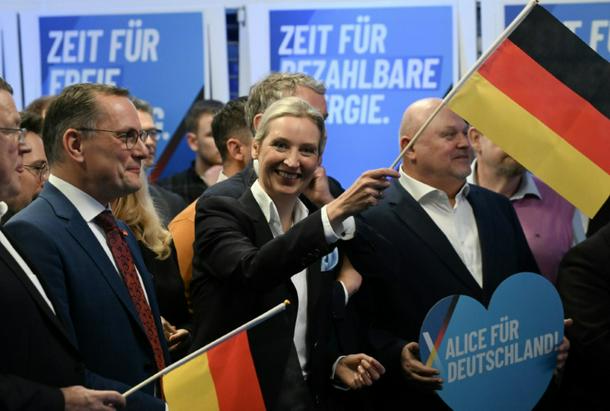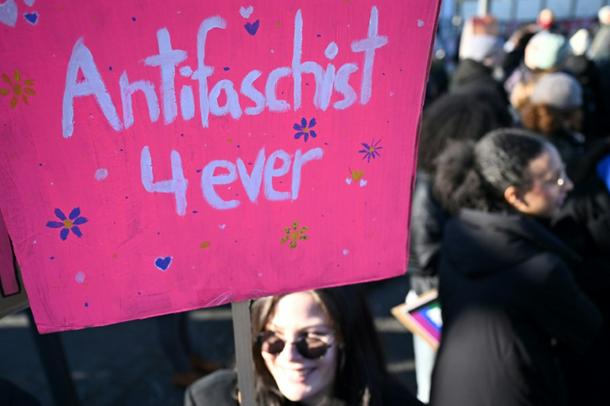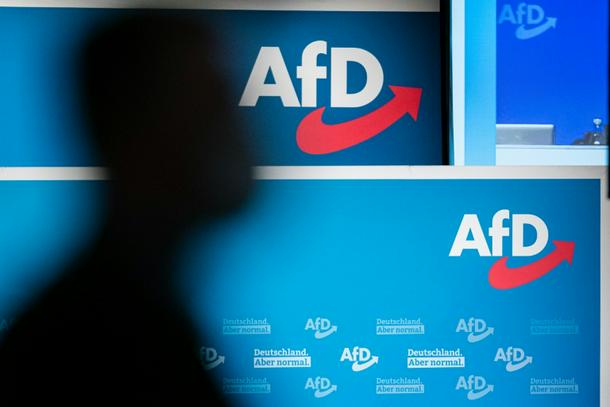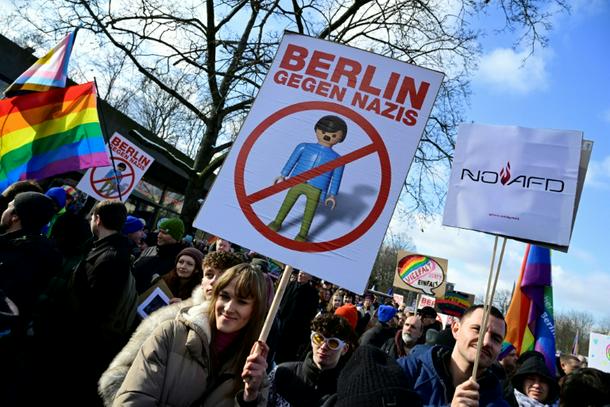
The Alternative for Germany party celebrated its best-ever election result in February
Frankfurt (Germany) (AFP) - Germany’s domestic intelligence service on Friday designated the far-right AfD party as an extremist group, setting off a diplomatic spat with the United States and fuelling calls for the party to be banned.
The BfV intelligence agency, which had already designated several local branches of the anti-immigrant Alternative for Germany (AfD) as right-wing extremists, said it moved against the entire party due to its attempts to “undermine the free, democratic” order in Germany.
The classification gives authorities greater powers to monitor the party by lowering the barriers for such steps as intercepting telephone calls and deploying undercover agents.
The conservative US administration quickly condemned the move. US Secretary of State Marco Rubio called it “tyranny in disguise” and said “Germany should reverse course”. President Donald Trump’s billionaire advisory Elon Musk has also defended the AfD.
The German foreign ministry took the unusual step of replying directly to Rubio on X to say: “This is democracy”.

An AfD campaign poster ahead of February elections read: 'Finally be free in your own country'
The ministry said that the “decision is the result of a thorough and independent investigation to protect our constitution” and could be appealed.
“We have learnt from our history that rightwing extremism needs to be stopped,” the ministry said.
The AfD slammed the move as a “heavy blow” to democracy, just months after they came second in a national election. It vowed to mount a legal challenge.
The designation revived calls within Germany to ban the party, heightening political tensions ahead of conservative Friedrich Merz becoming chancellor next Tuesday leading a coalition with the centre-left Social Democrats (SPD).
The SPD’s Lars Klingbeil, set to become vice-chancellor and finance minister in the coalition, said the government would consider banning the AfD.
“They want a different country, they want to destroy our democracy. And we must take that very seriously,” he told Bild newspaper, although he added the coalition would not make a hasty decision.
Incoming interior minister Alexander Dobrindt said the spy agency’s move “inevitably means there will be further observation of the AfD”.

Demonstrators rallied against the AfD in Neu-Isenburg on February 1
AfD co-leaders Alice Weidel and Tino Chrupalla charged in a statement that the party was “being publicly discredited and criminalised”, and that the decision was “clearly politically motivated” – a claim denied by the outgoing government.
The intelligence agency said the AfD “aims to exclude certain population groups from equal participation in society”.
In particular, the AfD does not consider German citizens with a migrant background from countries with large Muslim populations to be “equal members of the German people”, it added.
- Welter of controversies -
The party, founded in 2013, has surged in popularity by capitalising on fears over migration while Germany has suffered from a recession.

Germany's domestic intelligence agency classified the AfD as a right-wing extremist party
It won more than 20 percent of the vote in February’s election, a record result and behind only the centre-right CDU/CSU bloc of Merz.
Recent opinion polls have put the party neck-and-neck or even slightly ahead of the CDU/CSU alliance.
In a country still haunted by its Nazi past in World War II, establishment parties have vowed not to govern with or work with the AfD.
Merz breached this so-called “firewall” during the election campaign by relying on its support to pass a parliamentary motion demanding tougher immigration measures. That sparked widespread anger and nationwide protests.
He has since insisted he will not work with the AfD as he has formed a coalition with the SPD.

An activist in February held up a placard reading 'Berlin against Nazis'
The AfD during the election campaign won the backing of tech billionaire Musk who said only the AfD could “save Germany”, appeared by video at one of their rallies and hosted an interview with Weidel on his platform X.
On Friday he said banning the AfD “would be an extreme attack on democracy”.
The party has faced frequent controversies. One leading member has been convicted for using a banned Nazi slogan and others have been criticised for downplaying Nazi atrocities.
It has also faced allegations of close ties to Russia. This week a former aide to an AfD European Parliament lawmaker was charged over suspected spying for China.
AfD supporter Manuela Spitzwieser, a 54-year-old cleaner from the western city of Duisburg, also believed that the BfV action was politically motivated.
“It’s totally obvious – at the moment the AfD is leading in the polls,” she told AFP.
She predicted that if the party was banned there would be civil unrest “like they had in France with the yellow vests… or we would found a new party which would go through the roof at the next election.”